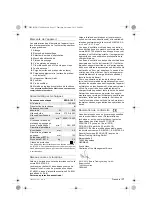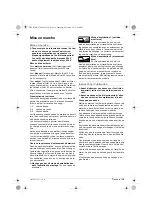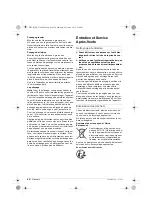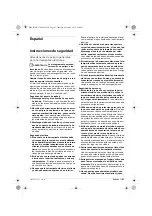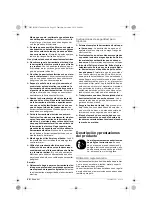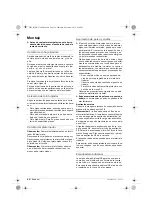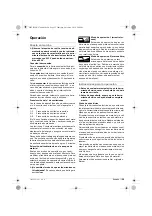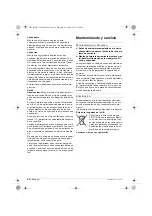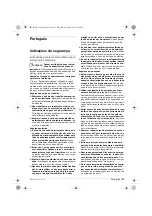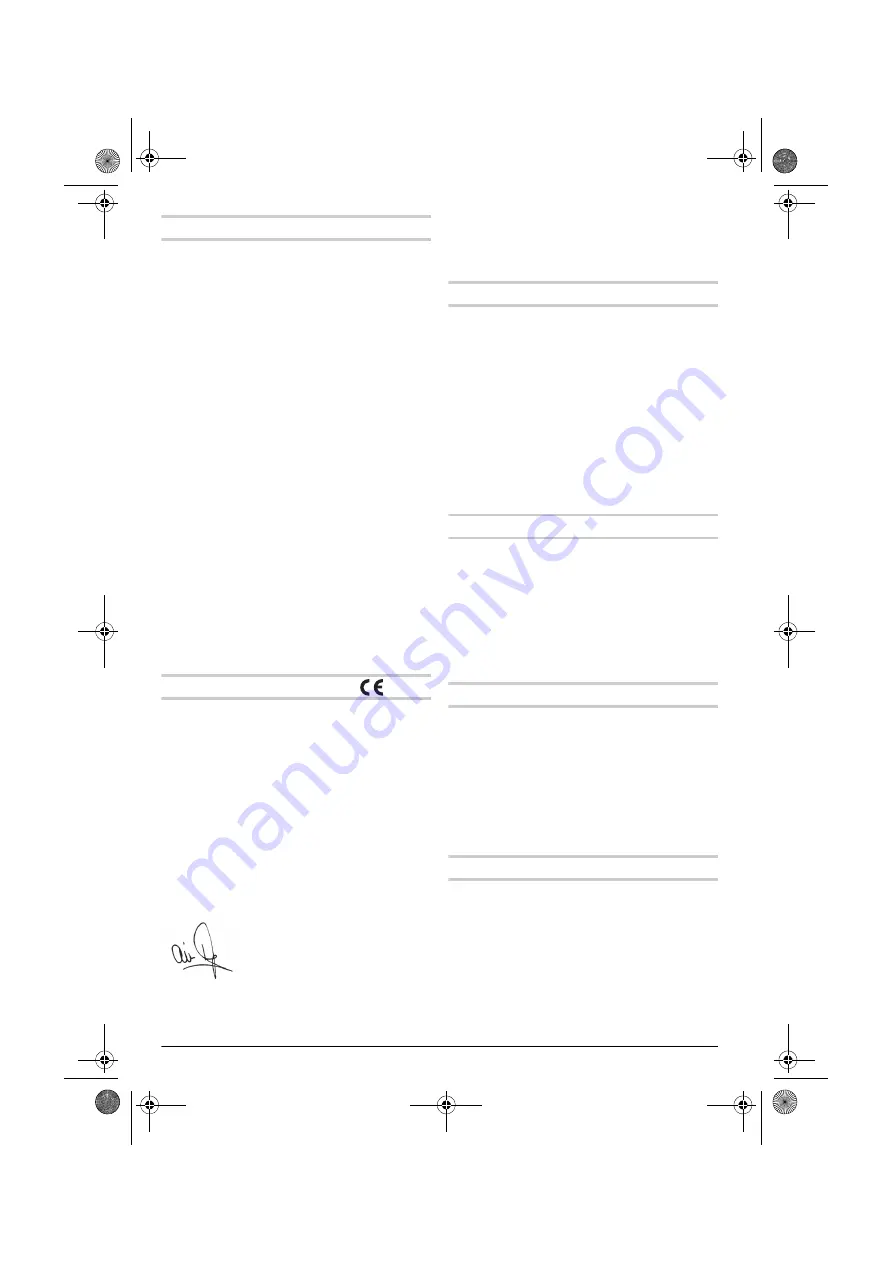
12
| English
1 609 92A 1CZ • 8.10.15
Noise/Vibration Information
Sound emission values determined according to
EN 60745-2-4.
Typically the A-weighted noise levels of the product
are: Sound pressure level 81 dB(A); Sound power
level 92 dB(A). Uncertainty K =3 dB.
Wear hearing protection!
Vibration total values a
h
(triax vector sum) and un-
certainty K determined according to EN 60745-2-4:
a
h
=4 m/s
2
, K<1,5 m/s
2
.
The vibration level given in this information sheet
has been measured in accordance with a standard-
ised test given in EN 60745 and may be used to
compare one tool with another. It may be used for
a preliminary assessment of exposure.
The declared vibration emission level represents
the main applications of the tool. However if the
tool is used for different applications, with different
accessories or insertion tools or is poorly main-
tained, the vibration emission may differ. This may
significantly increase the exposure level over the
total working period.
An estimation of the level of exposure to vibration
should also take into account the times when the
tool is switched off or when it is running but not ac-
tually doing the job. This may significantly reduce
the exposure level over the total working period.
Identify additional safety measures to protect the
operator from the effects of vibration such as:
maintain the tool and the accessories, keep the
hands warm, organisation of work patterns.
Declaration of Conformity
We declare under our sole responsibility that the
product described under “Technical Data” is in
conformity with all relevant provisions of the
directives 2011/65/EU, until 19 April 2016:
2004/108/EC, from 20 April 2016 on:
2014/30/EU, 2006/42/EC including their amend-
ments and complies with the following standards:
EN 60745-1, EN 60745-2-4.
Technical file (2006/42/EC) at:
Berner Trading Holding GmbH
Bernerstraße 6
74653 Künzelsau
GERMANY
08.10.2015, Berner Trading Holding GmbH
Bernerstraße 6
74653 Künzelsau
GERMANY
Assembly
Before any work on the machine itself, pull the
mains plug.
Replacing the Sanding Sheet
To remove the sanding sheet
8
, lift it from the side
and pull it off of the sanding plate
5
.
When attaching a new sanding sheet, remove any
dust or debris from the sanding plate
5
, e. g., with
a brush.
The surface of the sanding plate
5
is fitted with Vel-
cro backing for quick and easy fastening of sand-
ing sheets with Velcro adhesion.
Press the sanding sheet
8
firmly against the bottom
side of the sanding plate
5
.
To ensure optimum dust extraction, pay attention
that the punched holes in the sanding sheet match
with the holes in the sanding plate.
Selection of the Sanding Plate
Depending on the application, the machine can be
equipped with sanding plates of different hard-
ness:
– Sanding plate, extra soft: Suitable for polishing
and sensitive sanding, incl. on convex surfaces.
– Soft sanding plate: Suitable for all sanding appli-
cations and general-purpose use.
– Hard sanding plate: Suitable for high sanding ca-
pacity on flat surfaces.
Replacing the Sanding Plate
Note:
Replace a damaged sanding plate
5
immedi-
ately.
Pull off the sanding sheet or polishing tool. Com-
pletely unscrew the screw
6
and take off the sand-
ing plate
5
. Attach the new sanding plate
5
and
tighten the screw again.
Note:
When attaching the sanding plate, pay atten-
tion that the toothing of the drive element engage
into the openings of the sanding plate.
Dust/Chip Extraction
Dust from materials such as lead-containing
coatings, some wood types, minerals and metal
can be harmful to one’s health. Touching or
breathing-in the dust can cause allergic reac-
tions and/or lead to respiratory infections of the
user or bystanders.
Certain dust, such as oak or beech dust, is con-
sidered carcinogenic, especially in connection
with wood-treatment additives (chromate, wood
preservative). Materials containing asbestos may
only be worked by specialists.
Armin Hess
Chairman of the Management Board
OBJ_BUCH-1794-002.book Page 12 Thursday, October 8, 2015 3:48 PM

















